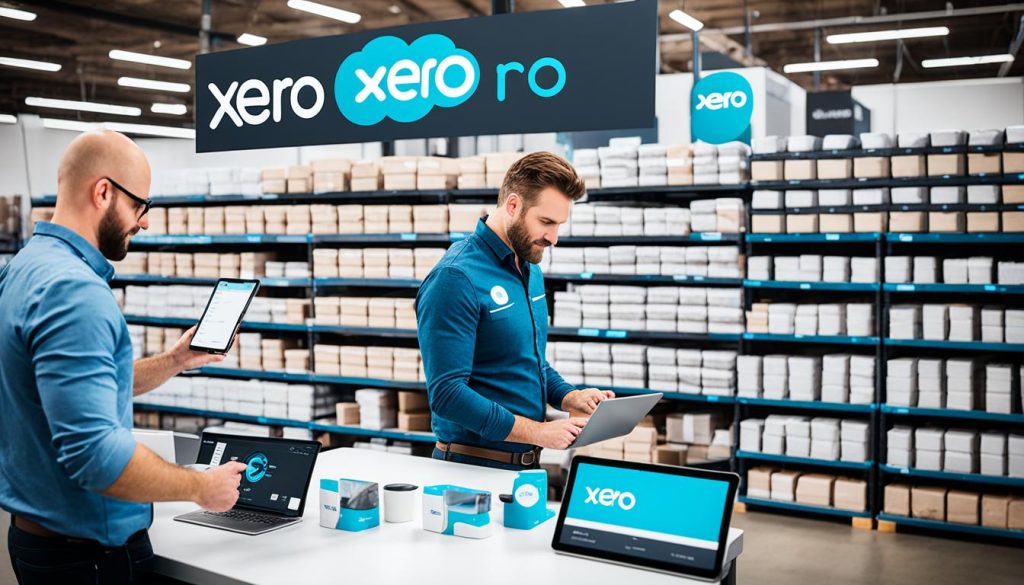In retail business, knowing your stock well is key. It’s crucial for your success. Using the right software to manage inventory is important. This type of software helps track items from making them to selling them. It also gives you useful data to improve how you handle stock.
There are many inventory systems, some free and others not. The free ones usually have less features. The ones you pay for can handle more items, offer better analysis, and work more smoothly with other tools. Choose based on what your business needs and can afford.
Finding the best inventory software can boost your business. It helps keep track of products, guesses what you’ll sell, and makes everything run better. Here, we will show you some great options for small UK businesses.
What is Inventory Management in Business?
Inventory management is vital for a business’ success, no matter its field. It handles the process of ordering, storing, and using inventory. This includes raw materials, parts, and finished goods. Good inventory management helps businesses meet demand, cut costs, and make more money.
Inventory management mainly aims to control the movement of goods in a company. It involves predicting demand, making purchases, watching stock levels, and getting products to customers on time. A good system helps businesses avoid common issues like overstocking or not having enough. It also boosts supply chain efficiency and customer happiness.
Keeping track of inventory, controlling stock, and managing supply chains are all key parts of good inventory management. These activities help companies always know what’s in their inventory. This way, they can act fast and make wise choices, reacting quickly to market shifts.
Warehouse management is another big aspect of inventory control. It’s about how goods are stored, taken out, and shared. A well-run warehouse makes the whole inventory process smoother. It cuts costs and betters the way goods are moved, improving the supply chain’s overall performance.
For any business, keeping inventory in check is key. It helps meet what customers want, reduces costs, and makes the business stronger compared to others in the market.

| Key Aspects of Inventory Management | Description |
|---|---|
| Demand Forecasting | Accurately predicting future customer demand to ensure the right amount of inventory is available |
| Order Processing | Efficiently managing the process of placing, receiving, and tracking orders |
| Stock Level Monitoring | Maintaining optimal inventory levels to prevent stockouts or excessive storage costs |
| Warehouse Management | Optimising the storage, retrieval, and distribution of goods within the warehouse |
| Supply Chain Coordination | Aligning inventory management with the broader supply chain to ensure timely delivery to customers |
Why Inventory Management is Importance for Small Businesses?
Managing stock is key for small businesses. They usually have fewer resources. So, they must be very efficient. Good inventory management brings several benefits:
- Avoid stockouts and ensure product availability
- Reduce storage and carrying costs
- Identify best-selling and slow-moving products
- Make informed purchasing decisions
- Improve cash flow
- Enhance customer satisfaction
Keeping just the right amount of stock helps avoid problems like missing out on sales. It also means customers will be happy. By managing stock well, these businesses can keep their costs down. This helps them use money for other important areas of their business.
Effective stock control also shows what customers love or don’t care for. This helps owners know what to buy. It makes sure the shelves or website have what customers really want. So, cash isn’t stuck in items not selling.
Good stock management is vital for small businesses. It boosts how well they run, their place in the market, and keeps customers happy. All work together for the business to thrive over time.
| Benefits of Inventory Management for Small Businesses |
|---|
| Avoid stockouts and ensure product availability |
| Reduce storage and carrying costs |
| Identify best-selling and slow-moving products |
| Make informed purchasing decisions |
| Improve cash flow |
| Enhance customer satisfaction |

What are the Features to Look for in Inventory Management Software?
Choosing the right inventory management software for a small business is crucial. It can make your work easier, boost efficiency, and give you useful insights for growth. Think about these features to pick the best one for your needs.
Scalability
Your business will grow over time, so your software should grow with you. It should handle more products, suppliers, and sales as you expand. Being able to adapt is key for your business’s future success.
Cloud Integration
Small business inventory software that uses the cloud has its perks. It lets you access your inventory info from anywhere, at any time. This is great for teams that are often on the move or working from different places.
Real-Time Data and Analytics
A good inventory software for small business must give you real-time data and analytics. This means you can watch stock levels and see sales as they happen. With this info, you can quickly adjust to what your customers need.
Mobile Access
Being able to use your inventory management software on the move is very useful. Look for software that has mobile apps or works well on phones. This way, you and your team can stay updated no matter where you are.
By keeping these features in mind as you look at inventory management software, you’ll set your small business up for success. The right tool will help you work better, make smarter choices, and grow in the long run.
Top 6 Best Inventory Management Software for Small Business
We’ve picked the top six inventory management software for small businesses. These tools make managing inventory easier. They help businesses work smoother, smarter, and grow faster.
- Xero
- Zoho Inventory
- FreshBooks
- Veeqo
- InFlow Inventory
- Sortly
The best inventory management software for small business are packed with helpful features. They include everything a small business needs. This could be tracking stock in real-time or managing orders from your phone. They’re great for businesses looking to simplify how they handle their goods.
Choosing the right inventory management software for small business is important. It depends on what your business needs are. Think about the features you really need. Then, find the software that matches those needs best.

1. Xero
Xero shines in helping small businesses handle their inventory. This accounting tool comes with xero inventory management features. It’s a top pick for those who want to simplify their work.
What sets xero inventory software apart is its tracking ability. It can follow items you buy and sell. This helps keep stock levels and values in check easily. Plus, it works well with other tools like InFlow Inventory.
Xero is a great fit for small companies with simple inventory needs. It combines accounting and inventory tasks smoothly. With Xero, owners can keep a close eye on their business and make better choices. And this, in turn, helps their business grow.

2. Zoho Inventory
Zoho Inventory is a top-notch inventory management tool by Zoho Corporation. It’s perfect for small businesses. The tool helps with tracking inventory, managing warehouses, and order fulfilment.
Zoho Inventory stands out because you can change it to suit your needs. This is great for small business owners. They can do things like manage stock across many places or handle purchase orders easily.
The platform’s interface is easy to use, which is a big plus. This means small business owners can find their way around and use its powerful features. They can see real-time data and make smart choices about their inventory with ease.
Key Features of Zoho Inventory:
- Comprehensive warehouse management, like tracking stock and checking expiry dates
- Works well with other Zoho apps, like Zoho Books and Zoho CRM
- Get real-time data and insights for better decision-making
- Access your inventory management tools from your phone
If you run a small shop, an online store, or a service business, Zoho Inventory is for you. It’s easy to adapt and use. This makes it a good pick for small business looking to improve and stay ahead.

3. FreshBooks
FreshBooks is a top choice for freelancers and small businesses. It’s known for its strong invoicing and expense tools. It also offers basic inventory tracking. FreshBooks lets users manage billable items and check stock levels.
For those with low inventory needs, FreshBooks is good. But, businesses needing more inventory support might look elsewhere. This guide recommends other software for such needs. FreshBooks is great for simpler stock management, especially for those focusing on invoicing and accounting.
| Feature | FreshBooks Inventory |
|---|---|
| Inventory tracking | ✓ |
| Stock level monitoring | ✓ |
| Invoicing integration | ✓ |
| Reporting and analytics | Limited |
| Barcode scanning | ✕ |
| Multi-location support | ✕ |
FreshBooks’ inventory tools are not as advanced as some software. Yet, it’s still suitable for small businesses. It helps in making invoicing and accounting simpler, with basic inventory tracking. For larger inventory needs, users are advised to check out other software in this guide.
4. Veeqo
Veeqo is a strong tool for keeping track of inventory and managing shipping. It’s made for both retail and wholesale shops. This tool is easy to use and brings all your sales info into one place.
Its standout features include tools for handling orders and keeping track of stock. There’s also a barcode scanner for quickly managing lots of items. This makes things move faster for small business owners.
| Feature | Description |
|---|---|
| veeqo inventory management | Centralised inventory tracking and control, updated in real time, and managing stock across different selling channels. |
| veeqo inventory software | Easy-to-use software for managing orders, checking stock, examining data, running reports, and handling warehouses. |
| veeqo for small business inventory | Has special features to help small businesses, with tools that can grow with you and are simple to use. |
Veeqo is perfect for small businesses that want a full veeqo inventory management system. It can make your work easier and help you see how your stock and sales are doing.
5. InFlow Inventory
InFlow Inventory is a top choice for small businesses needing inventory management. It brings together inventory and order management. This makes handling inventory easier. It includes tasks such as barcode scanning, tracking your inventory, managing warehouses, and detailed reports.
It’s known for linking with over 3,000 apps, like Xero. Connecting with Xero streamlines financial tasks. But, getting these links set up might need help from a developer.
| Feature | Description |
|---|---|
| Inventory Tracking | InFlow Inventory lets you see your stock in real-time. It helps business owners keep track of their incoming stock well. |
| Barcode Scanning | With its support for barcode scanning, updating product details, like stock levels and where they are, is made easier. |
| Reporting and Analytics | InFlow Inventory includes detailed reports and insights. This helps small businesses understand their stock and sales better. |
| Warehouse Management | It’s good for managing stock in several warehouses. This feature improves how small businesses handle their inventory. |
Overall, InFlow Inventory stands out as a strong and easy-to-use inventory tool. It’s ideal for small businesses aiming to smarten up their stock control and inventory processes.
6. Sortly
Sortly is great for small, non-retail businesses. It’s simple and easy to use. This makes it perfect for people new to inventory management software. It includes basic features such as warehouse management and inventory control.
But, it doesn’t do as much as some others. It’s also not as good when connecting to other software. Still, it’s a good choice for those starting out with digital inventory tools.
Sortly inventory software for small business shines in its simplicity. The design is clean and navigation is easy. This is great for owners or staff without much IT or inventory experience.
It fits the needs of small businesses well. Here are some key features:
- Barcode scanning for quick and accurate product identification
- Real-time inventory tracking and reporting
- Mobile accessibility, allowing users to manage their inventory on the go
- Integration with popular e-commerce platforms, such as Shopify and WooCommerce
Even though it’s not the most advanced, Sortly stands out for being simple and easy. It’s a good choice for making inventory management smoother. Plus, it’s affordable and easy to grow with your business.
| Feature | Description |
|---|---|
| Ease of Use | Sortly’s intuitive interface and simple layout make it an ideal choice for small businesses and users new to inventory management software. |
| Inventory Control | Sortly provides real-time inventory tracking, barcode scanning, and reporting to help small businesses maintain control over their stock levels. |
| Mobile Access | The Sortly mobile app allows users to manage their inventory on-the-go, making it a flexible solution for small businesses. |
| Integration | Sortly integrates with popular e-commerce platforms, but its integration capabilities are more limited compared to some other inventory management software. |
How to Choose the Right Inventory Management Software?
Choosing the right inventory software is crucial for small businesses. It influences how efficiently and profitably you operate. So, make sure to think through your choices.
Factors to Consider
Think about how many user licences you need. As your business grows, you might need more licences. Make sure the software you choose can grow with you. Also, consider software that can handle stock across many warehouses to boost your efficiency.
It’s key to look for software that can work with your existing systems. This helps avoid manual work and errors. Plus, it gives you a better overview of your operations.
Consider how easy it is to get started with the software. Pick something with an easy-to-use design and plenty of support. This speeds up the time it takes for your team to start using it.
Free vs. Paid Options
When it comes to inventory software, think about whether a free or paid option is best for you. Free versions are good for those with simple needs. But, paid options often include better features like detailed reports and analytics.
In the end, the best inventory software will fit your business’s unique needs. Think about the factors mentioned. This will help you choose software that boosts your business’s success.
Tips for Implementing an Efficient Inventory Management System
For small businesses, a good inventory system is vital. It helps keep stock levels right, cuts costs, and makes customers happier. Here are some handy tips for success:
- Know where you stand with stock, how fast it moves, and where issues lie. This info will guide software choices and spot where to improve.
- Find software that fits your business size and budget. Think about if it can grow with you, how it handles data, and if you can use it on the go.
- Get your team on board when choosing and introducing the new software. Listen to their thoughts and solve any worries to work together smoothly.
- Set clear rules for managing stock, like how to count it, when to reorder, and how to rotate it. Make sure everyone knows and sticks to these rules.
- Teach your team to use the software well. This lets them make the most of its features, saving you time and money.
- Always check how well your system is working and tweak it when necessary. Look out for big shifts in what customers want, problems with suppliers, or any other new needs that pop up.
By following these steps, small businesses can boost their inventory management. This means smoother operations, less spending, and improved inventory management for small business.
Conclusion
Effective inventory management is crucial for small businesses to thrive and stay competitive. By investing in the right software, they can gain real-time visibility of their stock, streamline their supply chain, and make informed decisions.
Key features to consider include scalability, cloud connectivity, data analytics, mobile usability, and alignment with their budget and specific needs.
A robust inventory system enables small businesses to meet customer demands efficiently, reduce costs, and boost profitability. This not only strengthens their market position but also sets the foundation for sustainable growth.
To succeed in a dynamic market, small businesses must continuously improve their processes and leverage the right tools to stay organized, satisfy customers, and achieve long-term success.
FAQs About Inventory Management Software for Small Business
How to keep track of inventory?
Small businesses can use manual methods like spreadsheets or automated solutions like inventory management software to track inventory effectively. Regular audits, categorization, barcodes, and proper labeling help maintain accuracy in inventory records.
What are the key features to look for in inventory management software for small businesses?
Key features include real-time tracking, barcode scanning, reporting tools, integration options, scalability, and a user-friendly interface. Support for multiple locations and future growth should also be considered.
How can inventory management software help streamline operations and reduce costs for small businesses?
Inventory software provides real-time stock visibility, automates reordering, and reduces stockouts and overstocking. It improves forecasting, increases turnover efficiency, and lowers costs associated with excess inventory or lost sales.
Are there specific inventory management solutions tailored for different types of small businesses?
Yes, inventory solutions are available for industries like retail, e-commerce, manufacturing, and distribution. These specialized tools cater to unique workflows and operational requirements.
How user-friendly is inventory management software for small businesses, and what kind of training is typically required?
Most inventory software features intuitive interfaces to simplify tracking tasks for small businesses. Basic training or online tutorials are usually enough to get started.
Can inventory management software integrate with other business systems such as accounting software for small businesses?
Yes, many inventory software solutions integrate with systems like QuickBooks or Xero. This helps synchronize data and improve overall efficiency in managing inventory and finances.
What are the common challenges faced by small businesses when implementing inventory management software?
Challenges include data migration issues, employee resistance, and initial setup time. Other hurdles may involve compatibility with existing systems and finding the right software fit.
How can small businesses measure the return on investment (ROI) of using inventory management software in their operations?
Businesses can measure ROI by analyzing reduced holding costs, improved efficiency, and fewer stockouts. Enhanced customer satisfaction and cost savings from better inventory control are also key indicators.





